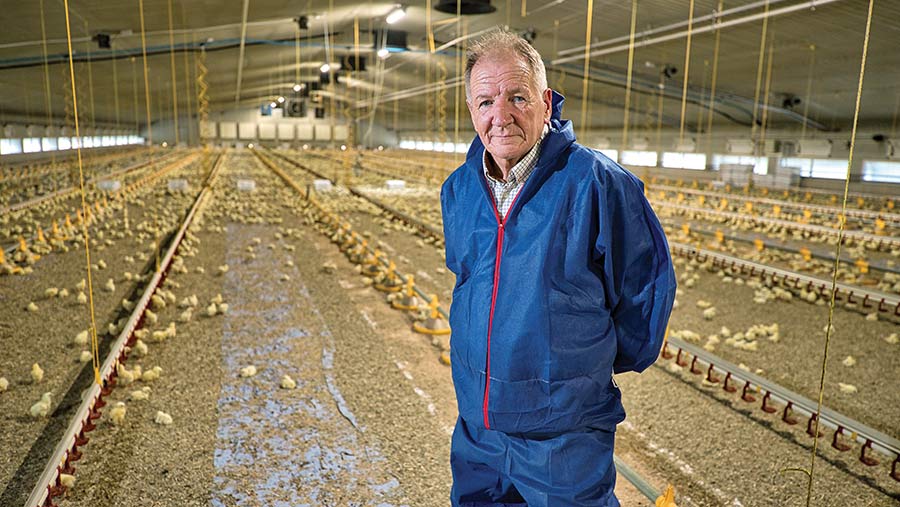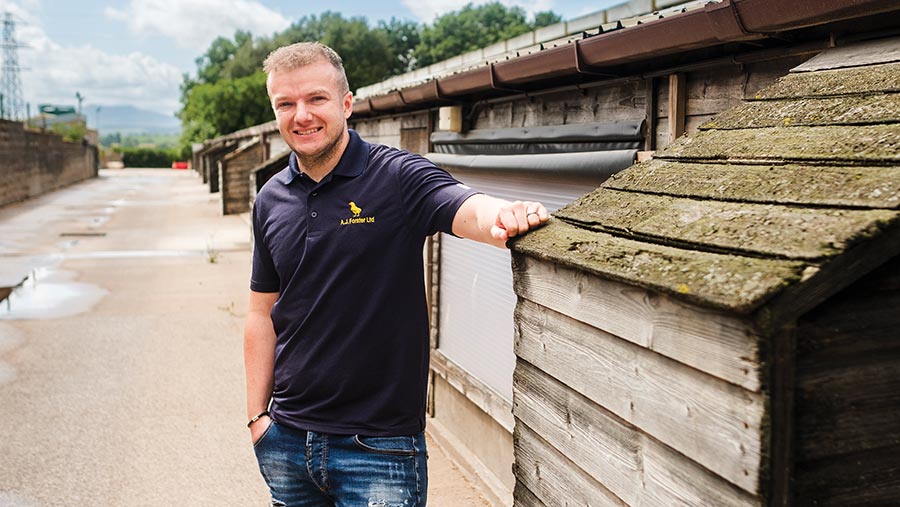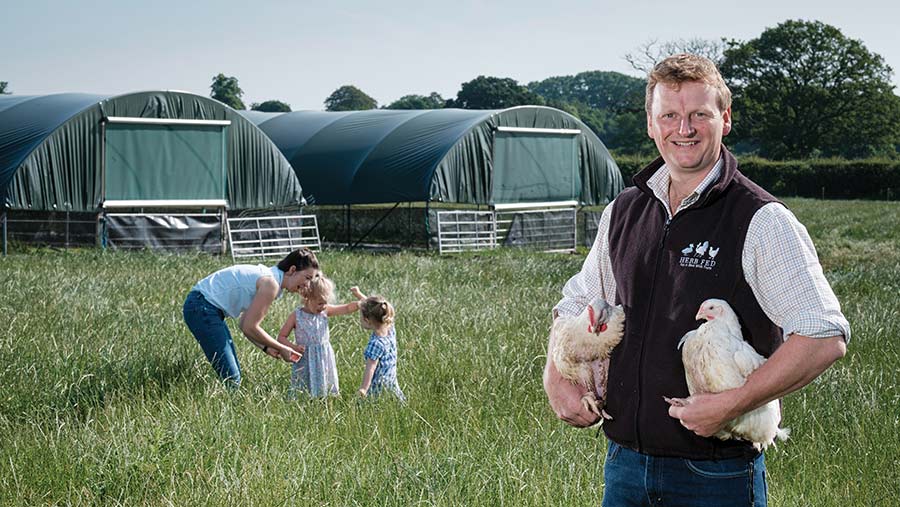Farmers Weekly Awards 2023: Poultry Farmer of the Year finalists

Egg producers often dominate in the Poultry Farmer of the Year category of the Farmers Weekly Awards, but this year’s finalists all come from the meat side of the industry, both intensive and free range.
See also: Farmers Weekly Awards 2023 – Grassland Manager of the Year finalists
The judges:
The judging team visited each of the finalists for a three-hour tour and interview.
- Last year’s winner Rebecca Tonks
- Farmers Weekly news editor Philip Clarke
- Independent judge Kerry Maxwell from the British Poultry Council
The finalists:
Nigel Edwards
Whittal Poultry, Herefordshire
Chris Forster
AJ Forster Ltd, Cumbria
Edward Wilkinson
Herb Fed Ltd, North Yorkshire
Nigel Edwards
Whittal Poultry, Herefordshire

Nigel Edwards © Richard Stanton
Farm facts
- 400ha of arable land in Herefordshire
- Grass seed growing and processing business
- State-of-the-art poultry sheds growing Red Tractor broilers for Avara
- Home-grown wheat used to supplement broiler diets
- Emphasis on renewable energy
A period of squeezed margins in the egg sector was enough to convince the owners of Whittal Poultry that a move into broiler production was a better option to secure the long-term future of their farming operation.
That process started in 2014, although securing planning permission for a new shed proved quite a challenge in an area of the country already attracting criticism for the number of poultry farms.
But perseverance paid off and the new 208,000-bird unit at Court Barns went into production in March 2019 – one of the last in the recent spate of “new builds” in the Herefordshire area.
Business focus
Starting from scratch provided the opportunity to build to a high standard, though taking out a £3.5m loan to achieve it took courage. But the location was favourable – just a few miles from Avara Foods’ chicken factory in Hereford and its nearby feed mill – and the figures stacked up.
Indeed, thanks to top technical performance, tight cost control and a healthy renewable heat incentive, the business is ahead of target for loan repayment.
Finding the right man to run the operation was crucial and, after a couple of “false starts”, owner Philip Whittal came across local poultryman Nigel Edwards – and there has been no looking back.
While Philip still does a shift as stand-in broiler manager when needed, it is Nigel who “steers the ship”, sourcing day-to-day inputs, liaising with contractors, and co-ordinating feed deliveries and turnaround.
“We discuss margins after every crop and always try to work out how we can do things better,” says Nigel, who benefits from a profit share arrangement.
Technical
The four large sheds are kitted out to maximise efficiency, with underfloor heating and two ground-source heat pumps to keep the air at the required temperature. A Lubing misting system also improves bird comfort.
Each shed has more feeders and drinkers than standard, and to help counter the soaring cost of electricity, solar panels have been fitted. Key parameters, such as air temperature, feed and water consumption, are carefully monitored on a fully computerised system, yet Nigel is adamant that such data can only achieve so much.
“I have the technology to control everything, but I prefer to see, hear and smell what’s going on, and will happily override the computer if necessary.”
Good gut health is a priority, helped by paying meticulous attention to clean water. Nigel is also reluctant to offer too much feed, too early. “I’m not looking for early growth,” he says.
It is no coincidence that he has achieved 10 successive European Production Efficiency Factor scores of above 420 since May 2021 and is in the top 10% of Avara broiler growers.
Environment and social
The whole unit has been developed with an eye on environmental protection and minimising waste. Trees have been planted to provide screening, and rainwater run-off is directed to a reed pond to slow flows and absorb nutrients.
Another innovation has been the use of screenings from the Whittal’s grass seed business as a novel, recycled bedding material. This has proved a great success and trials are ongoing to pelletise the product for use as top-up material as the birds get older.
With an eye to public engagement, the poultry sheds also have a viewing window.
What the judges say:
Attention to detail is everything for Nigel, as he combines modern technology with years of experience in the poultry industry.
Nigel Edwards summary
The judges liked:
- Great attention to detail
- Even spread of birds in all sheds
- Willingness to use new technology, but not to rely on it
- Happy to try new things and learn from mistakes
- Lots of energy and enthusiasm for the job
The numbers
- 1.49 Latest feed conversion ratio
- 10,112 Floor area (sq m) of poultry sheds
- 52,000 Birds per shed on average
- 2 Number of ground source heat pumps
- £30k Annual saving on woodchip from using home-produced grass screenings
Chris Forster
AJ Forster Ltd, Cumbria

Chris Forster © Joe Somerville
Farm facts
- Two sites with space for 658,000 broilers
- Production staggered to improve cash flow
- Birds thinned at 30 days and cleared at 40 days
- Solar panels to reduce electricity costs
- Biomass boilers and heat recovery system
When Chris Forster returned full time to the family farm in 2019, the broiler business was in a bit of a state, operating as an independent supplier in a competitive market, but underperforming both technically and financially.
But with boundless energy, an enthusiasm to learn, an eagle eye for data, and a willingness to take advice from others, Chris set about turning things around.
The departure of previous site managers created the opportunity to install a new team, while investment of his own money to improve the birds’ environment, and the signing of a new contract with Hook 2 Sisters, soon started to pay dividends.
Business focus
The 26 sheds are spread across two sites, with enough space for 658,000 broilers. Production is staggered across the two farms – each of which achieves seven crops a year. “That evens the workload and means we have 14 pay days, which smooths cashflow,” says Chris.
Cost has been an enormous challenge over the past two years – especially heating which has doubled in 12 months to around £600,000.
“Our costs have gone through the roof and we are not getting it back from the market,” he says. “However, we have managed to stay profitable through strict cost control.”
One example is the installation of shed windows, required for Red Tractor growers by October. Having been quoted £140,000 by a national firm, Chris and the team are doing it themselves for a fraction of that cost.
Staff motivation is also a key to success, and Chris prides himself on having brought in people with a non-poultry background and trained them to be able to undertake any task the operation throws at them.
Technical
The 26 poultry sheds that Chris oversees may date back to the 1980s, but clever investment in new technology has enabled the team to achieved numerous European Production Efficiency Factor (EPEF) scores of above 420, even exceeding 440 on three recent occasions.
This is a far cry from when Chris came into the business and EPEF scores of 370 to 380 were more typical. It is even more remarkable given that the farm is 120 miles from the slaughterhouse, meaning there is typically a 40g weight loss on birds in transit.
This is minimised by careful timing and management of the thinning and clear-out process, to make sure it goes smoothly.
The biggest change, however, has been the installation of a new computer-controlled ventilation system, biomass heating units and automatic air, water and light monitoring systems. “Suddenly, we had so much data and were able to use this to make changes.”
Chris is also continuously promoting good gut heath through the use of pre- and probiotics, and antibiotics use has fallen significantly.
The production data speaks for itself, with better feed conversion, reduced mortality and fewer factory rejects.
Environment and social
It’s not all about technical performance, however, and Chris is keen to put more back into the community, offering support to local schools and charities.
This is nowhere better exemplified than when he was approached by children’s charity Barnardo’s last year to see if he could provide work experience for a young lad who was suffering from anxiety and depression.
This he did willingly, and including him in the business for a few hours each week was enough to build his confidence and nurture his interest in poultry.
What the judges say:
It takes a lot to get a broiler unit into the Ross 420 club for production efficiency, but when you do it time and again, clearly something is going very right indeed.
Chris Forster summary
The judges liked
- Has returned the business to profit through effective management
- Excellent EPEF scores from relatively old buildings
- Good staff treatment and profit share scheme
- Excellent data management and control
- Involvement in local community
The numbers
- 1.48 Current feed conversion ratio
- 464 Highest EPEF score to date
- 22 Number of times in the Aviagen Ross 420 Club
- 2.6kg Weight of birds at 40 days
- 2-3% Bird mortality rate
Edward Wilkinson
Herb Fed Ltd, North Yorkshire

Edward Wilkinson © Jim Varney
Farm facts
- Free-range, herb-fed chickens and turkeys
- Total land area of 26ha, owned and rented
- 1,115 sq m cold store and meat processing factory
- Own fleet of vans to deliver fresh birds
- 17 staff, including farming, admin, butchery and delivery
For some poultry farmers, succumbing to avian influenza has been the final straw, triggering their departure from the sector. But for Edward Wilkinson it has been a time to reflect, focus on the direction of travel, and restock with a renewed will to succeed.
This determination is not surprising, given that Herb Fed Ltd has been built up from scratch, starting in 2009 with an 8ha rented field and a shipping container in which the first 500 Christmas turkeys were processed.
Two years later he was able to expand into year-round chicken production and invest in his own cutting plant. And five years after that, Edward bought a small farm near Easingwold in North Yorkshire, investing £1m of his own money in a state-of-the-art turkey processing facility.
Business focus
Such impressive expansion has taken commitment, but also a canny eye for marketing and meeting consumer demand.
“We speak to our customers every week to see how sales are and gather orders,” says Edward. “This ensures we have regular feedback.”
Butchers and farm shops account for about 90% of the firm’s trade, with birds delivered via Herb Fed’s own fleet of refrigerated vans across the country. The remaining 10% is sold online.
Being herb-fed gives the poultry a unique selling point, with branding and packaging designed to emphasise the high-quality product. This is supplemented by an active social media account.
But while quality is sacrosanct, Edward is careful with his pricing. “The key is to find something that differentiates us, but not that prices us out of the market,” he says.
Being hit by avian influenza last year was a hammer blow. But after the initial shock, Edward oversaw a comprehensive cleansing programme, and was able to restock in the spring and get the business back on track.
Technical
Slow growth and a unique herb-supplemented diet is the ethos behind chicken and turkey production at Herb Fed.
The chickens arrive at four weeks old, fully feathered and ready to go outside. They are housed in mobile huts on 16ha of rented ground away from the home farm.
They are slaughtered off-site at eight to nine weeks old, and return to Herb Fed’s butchery for packing or further processing. About 70% go out as whole birds.
While the bulk of the nutrition comes from a conventional ration, the birds are also given green waste from a local herb farm, spread on the ground outside their sheds to forage in.
“This enhances their quality of life, supplements their diet, and improves the taste and health of the bird,” says Edward. About 24,000 chickens are on farm at any one point.
Additionally, some 12,000 turkeys arrive each August, fully brooded from a farm in Kent, and housed in eight polytunnels on an 8ha range at the home farm, with access to a ready supply of herbs.
They are slaughtered on-site, then processed, dry plucked and game hung before being sent to butchers and farm shops for Christmas.
Environment and social
Environmental responsibility has always been a priority, with more than 200 trees planted in the past six months to increase biodiversity and help offset carbon emissions.
Regenerative farming is another principle, with minimal soil disturbance, clover cover to reduce the carbon footprint, sensitive mowing to encourage wildflowers, and beehives to bolster biodiversity. Waste water is collected and recycled, while chicken manure is exchanged for straw with a local farmer for mutual benefit.
Prior to the devastating outbreak of avian influenza, Edward also had an active policy of public engagement, although this has had to be curtailed for now.
What the judges say:
From a standing start, Edward has built up a business that offers a unique proposition to today’s discerning consumer, while capturing a decent margin in the process.
Edward Wilkinson summary
The judges liked
- Self-starter, looking to rebuild after bird flu outbreak
- High bird welfare, with minimal antibiotics
- Customer focused, both at wholesale and retail levels
- Plans to grow the business
- Taken on a business mentor to help improve business skills
The numbers
- 6,000 Weekly kill of Herb Fed chickens
- 2,000 Roosters for the Christmas trade
- 2.2kg Average chicken carcass weight
- 200 Butchers and farm shops taking weekly deliveries
- 94% Customers giving a five-star feedback
Sponsor’s message

“Aviagen is delighted to be sponsoring this year’s award, which recognises the breadth and depth of talent in the sector. Well done to all three finalists – and good luck.”
Stuart Thomson, regional technical manager – north Europe
